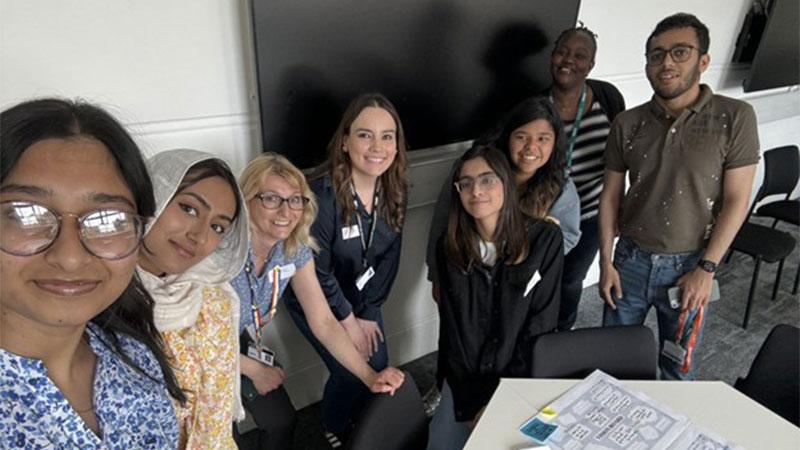The Westminster Centre for Education and Teaching Innovation (CETI) has invited current students to help rethink the comprehensive support programme offered to new students at the University.

CETI’s Transitions Project is a two-year endeavour funded by the Quintin Hogg Trust to improve transitions into higher education, which can be both exciting and overwhelming experiences for incoming Foundation and first-year students in particular. This work is central to the University’s Access and Participation Plan (APP) which aims to ensure all students experience an equitable, inclusive and impactful time at Westminster.
The workshop took place on 1 May and was designed and facilitated by CETI Senior Lecturer in Student Experience Daniela de Silva. The session featured a range of creative and reflective activities to gauge student satisfaction with their welcome experiences and centre the student voice through co-creation. Participants included undergraduate and postgraduate students from both home and international backgrounds, offering a wide range of perspectives.
The workshop opened with an activity titled The Welcome Collage, which was a creative exercise where students used magazines, newspapers and art supplies to visually represent how it felt to arrive at university, what they expected and what surprised them. Their collages sparked meaningful group discussions and revealed several shared memorable moments, including activities that helped students explore London and feel at home, as well as events that celebrated Westminster’s rich diversity, such as World in Westminster events celebrating a range of global traditions including Wesak, Passover and Iftar.

Students creating collages to explain their welcome experiences as first-year students at Westminster
For the second activity, students entered a challenge called the Idea Maze, which encouraged them to reflect upon their welcome experiences by mapping out their journeys through the early weeks of university life. Throughout the activity, students identified specific transition points and highlighted the challenges associated with each stage before reflecting on how they overcame them and what further support could be provided. Common stumbling blocks included the difficulty of balancing academic work with extracurricular responsibilities and navigating financial pressures.
In response, students co-developed ideas such as the provision of peer-to-peer support from the pre-arrival period, mental health and academic support interventions timed to known high-stress points in the term and a longer induction period extending beyond the first two weeks.
The final activity invited students to create vision boards for a reimagined supportive and inclusive welcome programme. Going forward, the students will have further opportunities to shape the Transitions Project as it progresses and will also gain valuable experiences by participating in the creation of digital interactive resources.
After hearing responses from students, Head of CETI Dr Andy Pitchford said: “It's fascinating to hear from students about how they think induction could be different. I think the emphasis on meeting peers and making connections is particularly important. It would be great if we could really prioritise this and perhaps place less emphasis on all the information which we think is key, but which may mean less to the students at this stage.”
About the project Norah Soufraji, Academic Professional Development Coordinator at Westminster, said: “I think academic and professional services staff can sometimes have our own ideas about what students want and need, and it doesn’t always match up with the lived reality of what students are facing. For this project, we want to ensure that we are centring the voices and experiences of our students, because they are the heart of the University and the reason we are all here. Students should be co-creating with us every step of the way.”
This project directly contributes to the United Nations Sustainable Development Goal (SDG) 3: Good Health and Wellbeing. Since 2019, the University of Westminster has used the SDGs holistically to frame strategic decisions to help students and colleagues fulfil their potential and contribute to a more sustainable, equitable and healthier society.
Find out more about studying at the University of Westminster.

Westminster student explaining their Idea Maze


